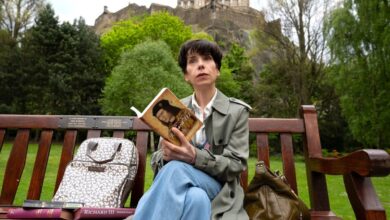David Quantick: ‘A good romcom is about sparring’

Unlikely as it may seem, David Quantick, the writer who once penned comedy sketches for Spitting Image and jokes about paedophiles for Brass Eye, is also the writer of this year’s most feelgood romantic comedy.
Released in time for Valentine’s Day, Book of Love – not to be confused with the 2016 film of almost the same title, The Book of Love, which starred Ted Lasso’s Jason Sudeikis and received a crushing 8 per cent rating on Rotten Tomatoes – is the charming tale of a man and a woman whose initial enmity for one another ultimately softens, like ice cream in the sun, into gloopy attraction.
It concerns a quintessentially uptight man, in this case a British man, Henry (played with maximum cheekbones by Sam Claflin), the author of a rather stodgy novel called The Sensible Heart, which dies an instant death upon its UK publication. When the book is a big hit in Mexico, Henry is surprised; he didn’t even know it had been translated.
He’s duly sent there on a publicity tour, where he is appalled to learn that his book has become, to all intents and purposes, an iteration of Fifty Shades of Grey, his translator Maria (Veronica Echegui) having rewritten the boring parts and transformed it into a bonkbuster. A sample line now runs: “They were naked, magnificent. They made love like two dragons exploding in the flames of a volcano.”
In many ways, Book of Love does everything a solid romcom should do. Henry and Maria spend much of the film bickering and squabbling and standing very close to one another. Close your eyes, and it could be Cary Grant stuttering all over Katharine Hepburn in Bringing up Baby.
“A good romcom means great dialogue,” says Quantick, on Zoom from his home in Hastings. “It’s part of a long tradition. Ever since Shakespeare’s Beatrice and Benedick, or whatever they were called (in Much Ado About Nothing), a good romcom is about sparring. Two people who fancy each other and spar is funny. Two people who want to go to bed with each other but don’t get on is funny.”
And Book of Love is funny. Before this unexpected turn in his writing career, David Quantick’s stock-in-trade tended towards reliably scabrous barbs. He’s a former NME journalist whose features dripped with sardonic asides; his primary concern, it always seemed, was more to make people laugh than to inform them about the intricacies of the new Ned’s Atomic Dustbin album.
But music journalism was never going to detain him for too long, or at least, not exclusively. In a career now into its fifth decade, he has since written television scripts for The Day Today, Blue Jam and TV Burp. He has collaborated on a play with Mike Batt, the man who made The Wombles sing, and has published guides on how to write “everything”.
“I suppose,” he says, “I’ve had a pretty random CV.” A moment later: “I’ve been eclectic.”
In person, or at least via a computer screen, Quantick doesn’t disappoint. He is as manifestly deadpan as his prose; a man who speaks with a mostly figurative, rather than literal, arched eyebrow. If eclecticism is the reason for his success, then it’s not so surprising that he has now turned his hand to romcom; more so is the fact that it’s taken him so long to get here. Turns out he’s always been a fan.
“What I like about them most, I think,” he says, “is that they’re about real relationships, not about people flying through the sky or looking forward to being turned into a range of plastic figures.”
The idea for Book of Love first came to him a decade ago while having a drink with a translator. “I started thinking: what if someone wrote a dry book that, once translated, became a sex book? What if the original source became, in its translation, a completely different thing?”
He took the script to a producer, Michael Knowles, with whom he’d collaborated previously on many projects, not all of which had reached the screen. “Yet,” Quantick corrects: “They haven’t reached the screen yet. No film project is ever finished. They just go on and on until, finally, they do make it.”
Book of Love made it, eventually. It was filmed last year by the Mexican director Analeine Cal y Mayor (who is listed as the screenplay’s co-writer). Because of Covid, Quantick was unable to go to Mexico to watch his dream realised, but was sent regular rushes via email. In Hastings, where it was frequently overcast, with rain threatening, he liked what he saw. “I’m sounding like a poster quote now, but some of it brought me to tears,” he says. “It did.”
Perhaps he experienced a certain relief, too. The romantic comedy genre remains a problematic one. For every shining example (When Harry Met Sally…), there are many absolute stinkers (Jason Sudeikis’s The Book of Love, for one). Quantick, avid student that he is, believed he knew how to avoid a stinker.
I wanted to write the bitchiest thing imaginable
“I’ve seen many that seem to suggest, in the way they’re made, that anyone can do this. I won’t name names,” he says, disappointingly, “but, you know, they’ve seen a Richard Curtis, and think they can do it too. But you can’t. You can’t copy Richard Curtis, you can’t copy Nora Ephron, and with Book of Love, I didn’t even try.”
David Quantick was born in 1961, and was raised in Plymouth. He wrote for the NME in his early 20s, but music journalism for him was only ever a stepping stone.
“I was in Paris, on my 30th birthday, interviewing [early Nineties indie act] Thousand Yard Stare, and, no offence to them, but I wasn’t interested in what they were saying. I wanted to say my own stuff.”
He’d recently been invited by Armando Iannucci to contribute to Iannucci’s Radio 4 show On the Hour, and has been writing for him ever since, most recently on the TV series Avenue 5, which stars Hugh Laurie in space, and Veep, for which he won an Emmy in 2019.
Julia Louis-Dreyfus in ‘Veep’, the show for which Quantick won an Emmy in 2019





